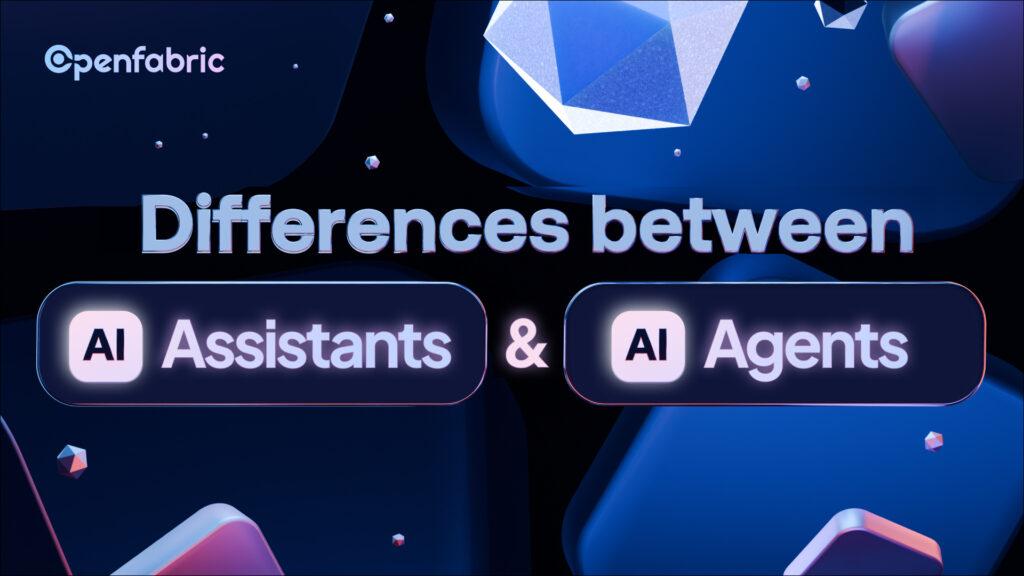
November 3, 2025 6 minutes read
What are the Differences between AI Assistants and AI Agents

Imagine you are a world-class model. In between the lights, shoots and runways, you’d need someone to handle your daily activities. Also you’d need another person to handle the workings of your career. As such, you would typically have an assistant that will help you around with your daily tasks, like taking calls, reminding you of appointments and what not. While your agent uses their skills to push you up the ladder. They work proactively to help you achieve your goals. Majorly, with assistants you tell them what to do and they stay within the confines of your request while agents use their skills to ensure that you advance. They may use your requests but they don’t need further instructions to continue doing their job.
AI assistants and AI agents work similarly to this scenario.
However, unlike human assistants and agents, the roles of AI assistants and agents may be interchanged and so their individual peculiarities may get lost in translation. However, an understanding of how they differ helps us to understand where and how they are better suited.
That is why in this article, we will discover some of the differences between AI assistants and AI agents and highlight use cases for each of them.
Let’s get started!
What is an AI assistant?
An AI assistant is a specific program that is designed to carry out designated tasks or answering questions based on the prompt the user inputs. Just as we described earlier, AI assistants are more like digital experts. It uses Natural Language Processing (NLP) to understand human language and retrieves data for the user with data retrieval.
These systems are designed to boost productivity and improve convenience by helping with day-to-day tasks such as setting reminders, summarizing documents, checking the weather stats and so on. Popular examples of AI assistants include; Siri, Alexa, and Google assistant.
How do AI assistants work?
AI assistants use pattern recognition and pre-trained machine learning models. These machine learning models are trained on vast amounts of texts and voice data. Therefore, when you give an AI assistant a command, it breaks it down into semantic chunks to understand the intent, retrieves the appropriate response, and executes it through connected APIs or devices.
There are three functional layers around which AI assistants are built.
- Input processing: using NLP to understand the command the user types in or says.
- Task execution: tracing your command to a specific set of data it was trained with.
- Response generation: providing human-like and contextually accurate response.
What is an AI agent?
An AI agent, on the other hand, takes the functions of an AI assistant a step further. Unlike AI assistants, AI agents are more advanced systems that are capable of making decisions without human intervention. These decisions are made after a number of complex steps that are all directed towards a particular goal. AI agents typically do not sit around and wait for orders. they are capable of acting on their own, plan, adapt, and plan again all to achieve a certain goal.
AI agents can reason, decide, and, adapt to an environment autonomously. Popular examples of AI agents include; Openfabric trading bot, self-driving car algorithms, and multi-agent AI systems.
How do AI agents work?
There are key technologies that are combined to make AI agents work the way they do. Hence, its complexity. These technologies include:
- Reinforcement learning: this technology allows AI agents to learn new optimal behaviors through trial-and-error. This is how the agents adjust their working processes until they achieve a set goal.
- Reasoning models: this allows the AI agents to think, almost like humans, before carrying out a task.
- Spatial awareness: with this technology, the agents can perceive and adapt to their environment. Therefore, providing results that are relevant to that environment.
- Multi-agent teams: this a new emerging technology. Here, multiple agents interact with each other and share resources to complete collective goals without sharing sensitive data.
AI Assistants vs AI Agents: 5 differences
AI assistants and AI agents all work to make processes easier and more convenient. However, each of them is best optimized for specific tasks which highlights their differences. Here are 5 differences between AI assistants and AI agents:
Autonomy
AI assistants are reactive AI systems that act only when instructed. The user asks the AI assistant to pull up a map of the city, and the AI assistant does just that.
AI agents, on the other hand, are proactive. They act based on the user’s goals and context. For example, in the same map scenario, an AI agent would provide real time information about the traffic density of that route, and provide alternative routes. In self-driving vehicles, the vehicle goes ahead to take the route and react to real world obstacles.
Learning
AI assistants operate based on a pre-trained set of data. As such, all its information is set in stone until the developers update the database. Therefore, it has limited learning abilities from the user’s data.
However, AI agents, through continuous learning, feedback, and reasoning. Reinforcement learning allows the model to learn and adapt from both users’ data and suboptimal results that it may have produced. Therefore, the performance of AI agents improves over time.
Complexity
AI assistants are pretty straightforward, and carry out simple tasks that are predefined. It is not designed for complex tasks. For example, management of FAQs by customer replying chatbots
AI agents, however, are designed for complex, dynamic and multi-step tasks. For example, the Openfabric trading bot analyzes the dynamic crypto market, and makes trades autonomously when the market conditions are favorable.
Decision-making process
AI assistants have fixed predetermined rules they follow. Just simple, and straightforward.
AI agents operate differently. They use reasoning models to make independent decisions. These decisions may change for the next task depending on the outcome of the previous task.
Adaptability
AI assistants adapts minimally to changes as it relies on static programming.
This is not the case with AI agents. AI agents are highly adaptable. They constantly adapt to their environment or to achieve their goals.
AI assistants vs AI agents: When to choose
The differences between AI assistants and AI agents do not put one above another. Each of them have specific scenarios where they both operate optimally.
When to choose AI assistants
You should consider using AI agents when you want to carry out specific task-based, and user-driven interactions.
For AI assistants, A=B. Therefore, it is best for;
- Generation of quick, straightforward answers
- Automation of repetitive, but simple tasks
- Automated replies that rely on users’ commands or queries. For example, in FAQs or chatbots.
- Conditions where a conversational interface is preferred to autonomy.
When to choose AI agents
You should consider AI agents when you want a more automated and intelligent system that can start a process, from planning to execution, without constant supervision. For AI agents, A=B, C, or D. Depending on the goal.
Therefore, AI agents are best used for processes such as:
- Automated trading and risk analysis
- Intelligent supply chain management
- Predictive maintenance in manufacturing processes and equipments
- Adaptive and personalized learning
Conclusion
AI assistants are similar to personal secretaries while AI agents are more independent, and act on their own. However, the line between AI assistants and AI agents is blurring fast. However, they both enhance convenience and make processes faster.
One is a helper while the other actively collaborates with you to achieve your goals. In other words, the choice depends on the results you want to achieve.
For more AI related information, visit our WEBSITE today!!!

